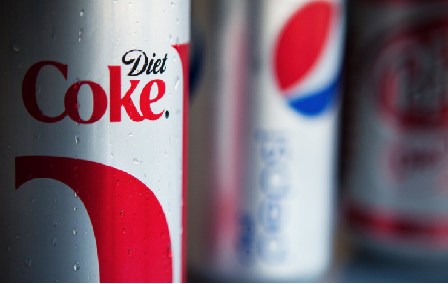Diet soda– sweet and fizzy like regular sodas with none of the guilt-have surged in popularity over the last two decades. These zero-calorie, sugar-free alternatives cater to people who are trying to lose weight or want a healthier beverage. However, a new study published by researchers at Massachusetts General Hospital in Applied Physiology, Nutrition and Metabolism has recently found that diet drinks may not actually contribute to weight loss; in fact, they can do the exact opposite and encourage weight gain.
The sugar-free sweetness in diet drinks is aspartame, a zero-calorie artificial sweetener. The use of aspartame in food and beverages has been studied thoroughly for decades now and the debate surrounding its use has made headlines numerous times in the past. During the 1990s, the use of artificial sweeteners generated controversy when a study found that its consumption might increase the risk of cancer in mice. Although, many later studies refuted these claims in humans, other scientists have suggested that regularly consuming artificially sweetened drinks and food can increase the risk of type-2 diabetes and metabolic syndrome, a cluster of conditions, including high blood pressure, high blood sugar, excess body fat around the waist and abnormal cholesterol or triglyceride levels.
In their recent paper, researchers at Massachusetts General Hospital, located in Boston, MA, examined another aspect of this controversy: weight loss. They asked whether diet drinks actually contributed to weight loss, and discovered that artificial sweeteners did not promote weight loss and even increased the risk of weight gain.
“Sugar substitutes like aspartame are designed to promote weight loss and decrease the incidence of metabolic syndrome, but a number of clinical and epidemiologic studies have suggested that these products don’t work very well and may actually make things worse,” explained Dr. Richard Hodin, the senior author of the study and a surgeon at Massachusetts General Hospital.
Dr. Hodin and his team studied four groups of mice for 18 weeks. Two groups were given a normal diet; of these two groups, one was given plain water, and the other was given water treated with aspartame. The other two groups of mice were given a high-fat diet; again, one of these groups received plain water, and the other received aspartame-treated water. Mice fed with the aspartame-treated water consumed the equivalent of nearly four cans of diet soda per day. After 18 weeks, the researchers discovered that mice who consumed aspartame through their drinking water gained more weight than those on the same diet, who were treated with plain water.
Dr. Hodin and this team then delved deeper into their findings to understand how aspartame changed how mice metabolized their food. By tracing how aspartame is processed in the body, they discovered that it breaks down into a product called phenylalanine following ingestion. Phenylalanine, a common amino acid, then inhibits intestinal alkaline phosphatase, an enzyme in the gut that is known to prevent diabetes and obesity.
“We found that aspartame blocks a gut enzyme called intestinal alkaline phosphatase (IAP) that we previously showed can prevent obesity, diabetes and metabolic syndrome; so we think that aspartame might not work because, even as it is substituting for sugar, it blocks the beneficial aspects of IAP,” said Hodin.
Furthermore, mice who received aspartame-treated water had higher blood pressure and blood sugar levels than those who were given plain water. Dr. Hodin and his team think that these differences in physiology can be attributed to glucose intolerance, one of the signs of diabetes. These findings further support past claims that link aspartame to increased risk of diabetes and metabolic syndrome.
“People do not really understand why these artificial sweeteners don’t work. There has been some evidence that they actually can make you more hungry and may be associated with increased calorie consumption…. While we can’t rule out other contributing mechanisms, our experiments clearly show that aspartame blocks IAP activity, independent of other effect.”
Dr. Hodin’s findings demonstrate a probable relationship between aspartame and serious diseases, including diabetes and metabolic syndrome. While it is unclear how aspartame behaves in humans, it is worthing thinking about these risks when you reach for another diet soda.




